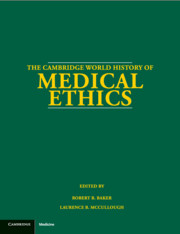Book contents
- Frontmatter
- PART I AN INTRODUCTION TO THE HISTORY OF MEDICAL ETHICS
- PART II A CHRONOLOGY OF MEDICAL ETHICS
- PART III DISCOURSES OF MEDICAL ETHICS THROUGH THE LIFE CYCLE
- PART IV THE DISCOURSES OF RELIGION ON MEDICAL ETHICS
- 9 The Discourses of Hindu Medical Ethics
- 10 The Discourses of Buddhist Medical Ethics
- 11 The Discourses of Confucian Medical Ethics
- 12 The Discourses of Early Christian Medical Ethics
- 13 The Discourses of Orthodox Christian Medical Ethics
- 14 The Discourses of Roman Catholic Medical Ethics
- 15 The Discourses of Protestant Medical Ethics
- 16 The Discourses of Jewish Medical Ethics
- 17 The Discourses of Islamic Medical Ethics
- PART V THE DISCOURSES OF PHILOSOPHY ON MEDICAL ETHICS
- PART VI THE DISCOURSES OF PRACTITIONERS ON MEDICAL ETHICS
- PART VII THE DISCOURSES OF BIOETHICS
- PART VIII DISCOURSES ON MEDICAL ETHICS AND SOCIETY
- Appendix: Biographies: Who Was Who in the History of Medical Ethics
- Bibliography
- Index
12 - The Discourses of Early Christian Medical Ethics
from PART IV - THE DISCOURSES OF RELIGION ON MEDICAL ETHICS
Published online by Cambridge University Press: 28 May 2012
- Frontmatter
- PART I AN INTRODUCTION TO THE HISTORY OF MEDICAL ETHICS
- PART II A CHRONOLOGY OF MEDICAL ETHICS
- PART III DISCOURSES OF MEDICAL ETHICS THROUGH THE LIFE CYCLE
- PART IV THE DISCOURSES OF RELIGION ON MEDICAL ETHICS
- 9 The Discourses of Hindu Medical Ethics
- 10 The Discourses of Buddhist Medical Ethics
- 11 The Discourses of Confucian Medical Ethics
- 12 The Discourses of Early Christian Medical Ethics
- 13 The Discourses of Orthodox Christian Medical Ethics
- 14 The Discourses of Roman Catholic Medical Ethics
- 15 The Discourses of Protestant Medical Ethics
- 16 The Discourses of Jewish Medical Ethics
- 17 The Discourses of Islamic Medical Ethics
- PART V THE DISCOURSES OF PHILOSOPHY ON MEDICAL ETHICS
- PART VI THE DISCOURSES OF PRACTITIONERS ON MEDICAL ETHICS
- PART VII THE DISCOURSES OF BIOETHICS
- PART VIII DISCOURSES ON MEDICAL ETHICS AND SOCIETY
- Appendix: Biographies: Who Was Who in the History of Medical Ethics
- Bibliography
- Index
Summary
INTRODUCTION
Jewish expectations of a Messiah who would free them from Roman rule and lead them to new heights of temporal power were especially high among Palestinian Jews of the early first century. Popular hopes, focused on various insurrectionists, were consistently disappointed. Very different from these claimants to messiahship was Jesus, who proclaimed a message of repentance and the imminence of the kingdom of God. His teaching and miracles, especially of healing, attracted large crowds and a small group of devoted followers. Jewish leaders, offended by his teachings and threatened by his popularity, which they feared would eventuate in violent suppression by the Romans, accused him of sedition and he was crucified. Belief that he had risen from the dead transformed his timorous and discouraged followers into bold heralds of the gospel of salvation from the penalty of sin, purchased by the death, and resurrection of their Messiah whose kingdom was not of this world. This revolutionary understanding of Old Testament messianic prophecies offended most Jews.
Many, however, became converts and obeyed their risen Lord's command to “make disciples of all nations” (Matthew 28:19; cf. Luke 24:47; Acts 1:8). As the new faith spread quickly through the Mediterranean basin, its adherents saw it as the fulfillment of Judaism, pagans saw it as a Jewish sect, and Jews saw it as a radical departure from Jewish tradition. Eventually the Roman imperial government distinguished it from Judaism and declared it an illicit religion.
- Type
- Chapter
- Information
- The Cambridge World History of Medical Ethics , pp. 202 - 210Publisher: Cambridge University PressPrint publication year: 2008



